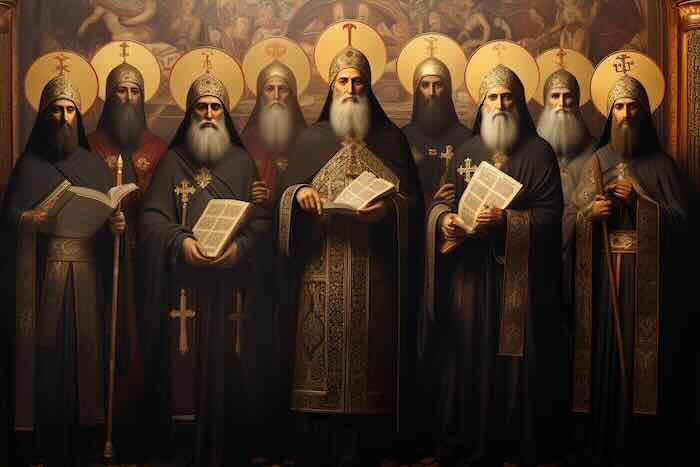The Role of Prayer and Meditation in Orthodox Christianity: A Spiritual Exploration

In the course of our research for the Lives, Miracles, and Wisdom of the Saints & Fasting Calendar, we often run across stories that constantly amaze us. We hope you enjoy them as much as we do.
In the rich tapestry of Orthodox Christianity, prayer and meditation hold a central place, weaving a thread of spiritual depth and contemplation through the fabric of the faith. This article delves into the profound role that these practices play in the lives of Orthodox Christians, exploring their historical roots, theological significance, and the transformative impact they have on believers.
Historical and Theological Foundations
Orthodox Christianity, with its ancient roots and traditions, places significant emphasis on the practice of prayer and meditation. These practices are not just religious duties but are considered vital pathways to experiencing God's presence and grace.
- Historical Roots: The tradition of prayer and meditation in Orthodox Christianity can be traced back to the early Christian monastics, known as the Desert Fathers and Mothers, who retreated into the deserts of Egypt and Syria seeking spiritual depth and communion with God. Their teachings and practices have profoundly influenced Orthodox spirituality.
- Theological Significance: In Orthodox theology, prayer and meditation are seen as essential in the process of theosis, or deification, which is the transformative process of becoming more like God in one's life. This is not a literal becoming divine but rather a process of growing in spiritual intimacy and likeness to God.
Forms of Prayer in Orthodox Christianity
Orthodox Christian prayer takes various forms, each serving different spiritual needs and expressions:
- Corporate Liturgical Prayer: This is communal prayer experienced during the Divine Liturgy and other services. It is characterized by a rich tapestry of hymns, chants, and responses, designed to involve the whole person – body, mind, and spirit – in worship.
- Personal Prayer: Personal or private prayer in Orthodox Christianity often involves the use of the Jesus Prayer ("Lord Jesus Christ, Son of God, have mercy on me, a sinner"). This simple yet profound prayer is repeated as a way to foster a continuous awareness of God's presence.
- Prayer of the Heart: This form of prayer moves beyond words into a silent, contemplative presence before God. It is often associated with Hesychasm, a mystical tradition within the Orthodox Church that emphasizes inner quietness and the prayer of the heart.
The Practice of Meditation
While meditation in Orthodox Christianity might differ from the practices found in Eastern religions, it shares the goal of seeking a deeper, transformative encounter with the divine. Orthodox meditation often focuses on scripture (lectio divina), icons, or the Jesus Prayer, guiding the believer into a deeper contemplation of God's mysteries.
The Impact of Prayer and Meditation
The regular practice of prayer and meditation in Orthodox Christianity has a transformative effect on the believer:
- Spiritual Growth: These practices deepen one's relationship with God, fostering spiritual growth and maturity.
- Inner Peace and Healing: Through prayer and meditation, many find inner peace, healing from past traumas, and strength to face life's challenges.
- Community and Solidarity: Corporate prayer and liturgical participation foster a sense of community and solidarity among believers, uniting them in their spiritual journey.
Challenges and Contemporary Practice
In today's fast-paced and often secular world, maintaining a regular practice of prayer and meditation can be challenging for Orthodox Christians. However, the Church offers guidance and support through its liturgical life, spiritual fathers, and community resources.
Conclusion
In Orthodox Christianity, prayer and meditation are not peripheral practices but are central to the faith's spiritual life. They offer pathways to encountering the divine, transforming the believer, and fostering a deep sense of peace and purpose. As ancient as they are, these practices continue to offer profound relevance and solace in the modern world, guiding believers on their spiritual journey towards theosis and a deeper communion with God.
Frequently Asked Questions

What is the primary purpose of prayer and meditation in Orthodox Christianity?

In Orthodox Christianity, the primary purpose of prayer and meditation is to facilitate a deep, personal communion with God. These practices are central to the process of theosis, which is the spiritual journey of becoming more like God in one's life, fostering spiritual growth, inner peace, and transformation.

How does Orthodox Christian meditation differ from other forms of meditation?

Orthodox Christian meditation often focuses on scripture (lectio divina), icons, or the Jesus Prayer, and is more centered on a contemplative encounter with God, rather than emptying the mind or achieving personal enlightenment. It's about deepening one's understanding and connection with the divine mysteries.

What is the Jesus Prayer and how is it used in Orthodox spirituality?

The Jesus Prayer is a short, formulaic prayer in Orthodox Christianity that says, "Lord Jesus Christ, Son of God, have mercy on me, a sinner." It is used for personal prayer, often repeated as a form of meditation to foster a continuous awareness of God's presence and as a tool for spiritual growth and reflection.

What is Hesychasm in the context of Orthodox Christianity?

Hesychasm is a mystical tradition within Orthodox Christianity that emphasizes inner stillness and the prayer of the heart. It involves a deep, contemplative form of prayer that seeks to achieve a direct and personal experience with God, often through the repetition of the Jesus Prayer.

Can anyone practice the forms of prayer and meditation found in Orthodox Christianity?

Yes, while these forms of prayer and meditation have their roots in Orthodox Christianity, they are accessible to anyone seeking a deeper spiritual experience. However, they are best practiced within the context of the Orthodox faith and guidance from a spiritual mentor or father for a more authentic and enriching experience.





